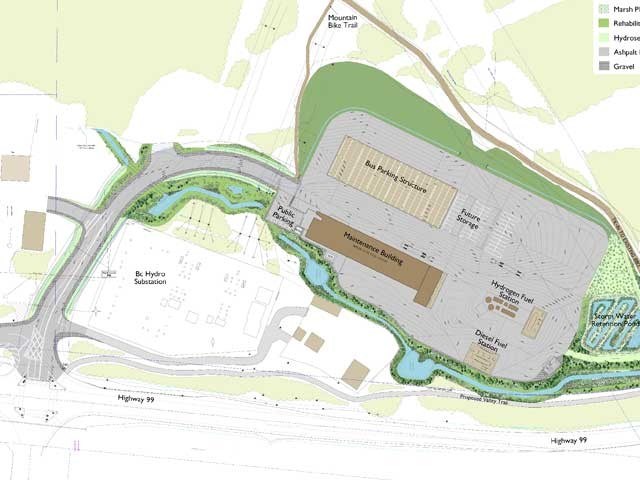B.C. Transit's president could not confirm this week that Whistler's new bus facility will cost $24 million.
Manual Achadinha said he does not want to release the budget yet because construction bids are still out to tender, and he doesn't want to tip-off prospective companies.
But he added the budget is "nowhere near $80 million."
"We will go to council with the budget, probably within a month or so," said Achadinha sitting inside the Westin Resort during B.C. Transit's open house Thursday.
Added Joanna Morton, media relations for B.C. Transit: "We hope to have a budget out once we factor in some comments from the second open house and also rework the road layout."
Last month, municipal staff asked B.C. Transit for more financial information on the project, since the Resort Municipality of Whistler is required to pay 57 per cent of the construction costs.
At that time Brian Barnett, general manager of environmental services for the municipality, said the bus facility is one of the main reasons for Whistler's $1.4 million increase in transit costs this year.
The $24 million figure for the facility has been discussed in private conversations in recent weeks.
The new location will be more centralized than the current site in Function Junction, and will be large enough to accommodate the 20 hydrogen cell buses coming to Whistler next August as part of a provincial-federal funded pilot project.
Once complete the bus facility will be owned by B.C. Transit.
Councillor Ted Milner, who sits on Whistler's Transit Management Committee, said he is uncomfortable that the RMOW has so little control over the project.
"I don't have a good feeling about it, and I have a feeling we are going to get a large bill," said Milner.
"The RMOW is permitted to pay for half of it, but we don't have half the approvals, so they (representatives from B.C. Transit) are going to tell us what it costs."
He said even though the RMOW has not looked at the budget, it appears the cost is "going to be very high."
"I have had a number of people who know more than I do about buildings give me feedback that there are shortcomings we have to talk about," said Milner.
Milner said the RMOW has asked B.C. Transit to present its building plans to Whistler's advisory design panel, with feedback from council.
Meanwhile, most of the information at the open house focused on measures B.C. Transit has taken to mitigate environmental impacts. The project stirred up controversy last year because the construction site was an environmentally sensitive wetland, at one time used by cougars, lynxes, beavers and other animals.
One poster stressed that the facility's size has been reduced from 8 acres to 5.6 acres; the buildings are designed for LEED compliance; and runoff from the facility and hillside will be treated in bio-filtration ponds.
The environmental proposals have also been approved by B.C.'s Ministry of Environment, read the sign.
Achadinha said B.C. Transit will review input they get from the community this week to tweak their plans.
"If the community is comfortable, this is what we will build," he said.
Morton added that B.C. Transit representatives at the open house noted that the tone of the community has really changed from last September.
"We feel our messaging is getting across, and people are truly understanding we are doing our best to be a good corporate citizen to the Whistler community," she said.
Twenty-one people attended the open house.
Dave Williamson, owner of Cascade Environmental who came to the open house to review the plans, said it is clear engineers working on the site plan "did what they could do with what they had to work with."
However he called the bus facility a "general disappointment."
"What it is is what it is, and it is a pretty nasty piece of work when you look at it from an environmental perspective, and it is all related to the site."
Williamson said the environmental impacts are completely associated with the site location, and the bus facility has "obliterated any opportunity for wildlife movement through there."
Even though construction has already begun on the bus facility, the design plans will not be finalized until June, said Achadinha.
Also, the lease agreement with BC Hydro, who owns the land where the bus facility will go, has not yet been signed.
Achadinha said he is not worried this could cause cost overruns.
He added that if hydrogen is not deemed to be a viable fuel after the five-year pilot program is complete, it will be easy to "unplug" the system and revert to a different energy source.
"We have designed a long-term solution for the community," said Achadinha.
The bus facility is slated to open in January 2010 and has been designed to hold up to 50 buses. During the Olympics, 140 buses will be docked there. (See related story for more information on transportation during the Olympics.
Mayor Ken Melamed declined to comment on the project this week since he did he not attend the open house, and the bus facility is not an RMOW project.




